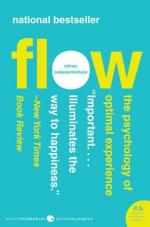
|
| Name: _________________________ | Period: ___________________ |
This test consists of 5 short answer questions, 10 short essay questions, and 1 (of 3) essay topics.
Short Answer Questions
1. Being able to expand the consciousness infinitely would render humans __________, according to the author.
2. The author believes that the final analysis of the _________ order of the consciousness is incomplete and that it requires further study.
3. The author reminds the readers that __________ is a great contributor to the achievement of flow.
4. In our everyday lives, we are limited to experiencing complete _________ because of our preconceived notions about life.
5. When the man is trying to find out why he got passed over for the job, what is the first reaction the author says he could have?
Short Essay Questions
1. Where does flow tend to occur most often in life, according to the author?
2. What does the author want people to realize about the idea of challenges?
3. What might happen if a person were to burst into an office demanding answers as to why they got passed over for a promotion?
4. What does Csikszentmihalyi mean when he talks about the idea of an autotelic person?
5. What are some of the problems an autoletic person can encounter in trying to achieve flow?
6. What is the question that the book says psychologists and philosophers are no closer to finding the answer to?
7. What is consciousness, according to the author, causing it to seem less like a mystical thing?
8. How are people's perceptions affected, according to the author of this book?
9. What can the self give insight into, according to Csikszentmihalyi in this section of the book?
10. What is a person able to do as a result of having a consciousness, according to the author?
Essay Topics
Write an essay for ONE of the following topics:
Essay Topic 1
Changing your reaction to the events in your life that upset you can lead to happiness even in the face of trauma.
Part 1: Why do you think changing your reaction is a way to create happiness?
Part 2: Do you think it's easy to change your reaction to difficult situations?
Part 3: How can one learn to change their reactions to situations? Or can't they? Is this an inherent quality of only some people?
Essay Topic 2
The author says that many enjoyable acts involve challenges too, which is not necessarily a bad thing.
Part 1: Do you agree with the author's statement about enjoyment being intertwined with challenges?
Part 2: How do you think life would be different if there weren't any challenges? Or wouldn't it be different?
Part 3: Why do you think that challenges are a part of enjoyment?
Essay Topic 3
The question of what happiness is becomes the guiding force of this book, causing the initial discussion and everything that comes after.
Part 1: Why do you think the definition of happiness is important to the author?
Part 2: Do you think the discussion of what happiness is is an important discussion? Support your answer.
Part 3: In what ways might the world change if people were not looking to become happier?
|
This section contains 720 words (approx. 3 pages at 300 words per page) |

|




